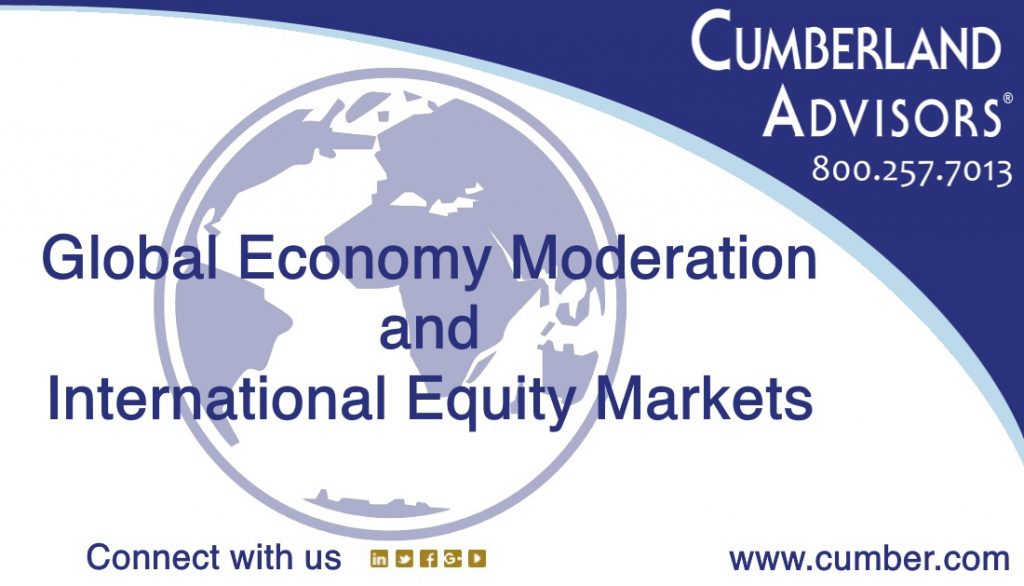As 2018 draws to a close, economic growth in almost all economies, including that of the US, is moderating but is still expansionary and in most cases remains above long-term trends.
For the year 2018 as a whole, global growth looks likely to be the same as for 2017, 3.7%, with advanced economies advancing at a 2.4% pace and emerging markets at a robust 5% pace. The recent moderation in growth appears likely to continue into 2019, but with annual rates for the year remaining very close to those for the current year. This outcome would be far better than the recession some are predicting. Downside risks, however, are growing.
Global equity markets, particularly those outside the United States, have significantly undershot these relatively benign economic prospects due to heightened uncertainty about a deepening trade war, slower growth in China, the Brexit negotiations in Europe and tighter global liquidity with higher interest rates as central banks around the globe, with the exception of the Bank of Japan are normalizing monetary policy (“withdrawing the punch bowl”). These uncertainties, together with leading indicators signaling slowing economic momentum, have undermined risk appetites, driving almost all international equity markets to painful losses for the year to date. Another factor was the generally elevated valuations at the beginning of the year.
The iShares All Country ex US ETF, ACWX, is down 15.6% year to date December 17th on a total return basis. Eurozone markets, as measured by the iShares MSCI Eurozone ETF, EZU, have lost 18.1%, with the iShares MSCI Germany ETF, EWG, down 23.1%; iShares MSCI France ETF, EWQ, down 14.7%; and iShares MSCI Italy ETF, EWI, down 19.9%. Elsewhere in Europe, the iShares MSCI United Kingdom ETF, EWU, has lost 18.5%; and the iShares MSCI Sweden ETF, EWD, is down a similar 17.5%. Advanced markets in Asia fared better this year. The iShares MSCI Japan ETF, EWJ, is down just 13%, perhaps in part because Japan’s expansionary monetary policy is being maintained. Also, the iShares MSCI Hong Kong ETF, EWH, has outperformed, with a loss of just 10.3%. Similarly, the iShares Taiwan ETF, EWT, is down 13.4%.
As is the case with advanced markets, emerging markets as a group are down some 17.5% year to date, as measured by the iShares MCSI Emerging Market ETF, EEM. Here also there are significant differences among the individual national markets. The economic slowdown in China, due in part to trade difficulties vis-à-vis the US and more importantly to the ongoing domestic credit crunch, is affecting other emerging-market economies. China’s equity market, as measured by the iShares MSCI China ETF, MCHI, fell 18.8%. The iShares MSCI Korea capped ETF, EWY, has lost 22.3%, while the iShares MSCI Indonesia ETF, EIDO, has performed better, losing 13.9%. In Latin America, the iShares MSCI Mexico capped ETF, EWW, has dropped 20%, while the iShares Brazil capped ETF, EWZ, has recovered from a steep fall to end up down only 5.2%.
Looking forward, while the base case economic outlook is for only a modest further slowdown in global growth, the important uncertainties present downside risks that will continue to affect market sentiment. In particular, failure of the US and China to lower trade tensions would have significant negative market and economic effects, as would a failure in UK-EU Brexit negotiations that results in the UK exiting the EU without a deal. The eventual outcome of US negotiations with North Korea is another important unknown. And investors will likely remain concerned about the possibility of a sharper economic slowdown, in particular one coming from slower growth in China. They also are seeking a clearer view of the likely pace of further monetary policy tightening by the Federal Reserve and by the European Central Bank. A positive factor is that the year will start with equity asset valuations that are more attractive than they were last January, due to a combination of price declines and positive earnings growth. Also markets are heavily oversold. If the major downside risks do not materialize, the outlook next year is for modest positive risk-adjusted returns. Close monitoring of developments and selectivity among markets will be desirable.
William Witherell, Ph.D.
Chief Global Economist
Email | Bio
Sources: Goldman Sachs Economic Research, Barclays, Financial Times, IMF, CNBC
Links to other websites or electronic media controlled or offered by Third-Parties (non-affiliates of Cumberland Advisors) are provided only as a reference and courtesy to our users. Cumberland Advisors has no control over such websites, does not recommend or endorse any opinions, ideas, products, information, or content of such sites, and makes no warranties as to the accuracy, completeness, reliability or suitability of their content. Cumberland Advisors hereby disclaims liability for any information, materials, products or services posted or offered at any of the Third-Party websites. The Third-Party may have a privacy and/or security policy different from that of Cumberland Advisors. Therefore, please refer to the specific privacy and security policies of the Third-Party when accessing their websites.
Sign up for our FREE Cumberland Market Commentaries
Cumberland Advisors Market Commentaries offer insights and analysis on upcoming, important economic issues that potentially impact global financial markets. Our team shares their thinking on global economic developments, market news and other factors that often influence investment opportunities and strategies.


